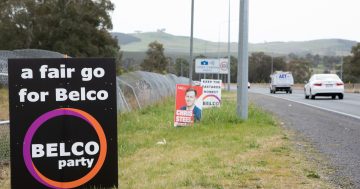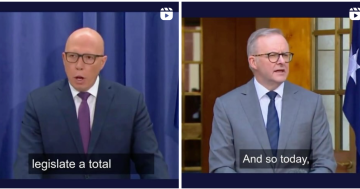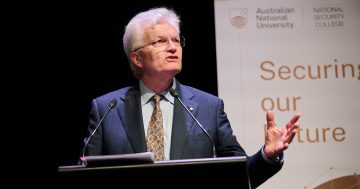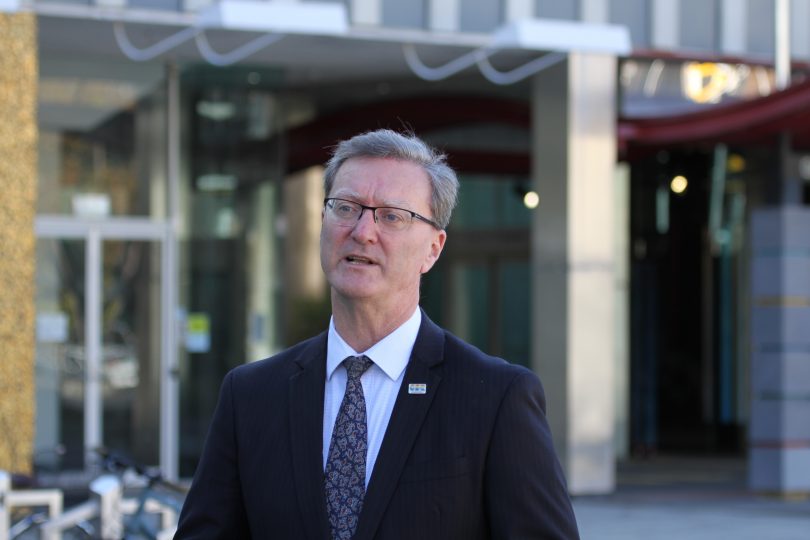
ACT Attorney-General Gordon Ramsay says the new bans on political donations from property developers will lower the risk of corruption. Photo: Dominic Giannini.
Political donations from property developers have been banned in the ACT and any gifts above the value of $1000 need to be disclosed to the ACT Electoral Commission within seven days.
However, the new legislation will not come into effect until after the 2020 ACT election, in mid-2021.
An amendment moved by the Greens to ban donations from pokies lobbies was voted down by both Labor and the Liberals.
ACT Attorney-General Gordon Ramsay said the changes would lower the risk of corrupt conduct during ACT elections.
“Property developers depend heavily on decisions made by government about land development applications and other processes,” he said.
“There is a strong public interest in reducing the prospect of planning decisions being influenced by political donations.”
The legislation comes on the back of the ACT Government announcing a four-year $4.9 billion infrastructure package to lead the Territory’s economic recovery.
The electoral reforms were included in the 2016 parliamentary agreement between Labor and the Greens, which outlined measures to be undertaken in this term of government to ensure confidence from the Greens, who hold the balance of power.
The reforms were also recommended in the report of the Select Committee on the 2016 ACT Election and Electoral Act tabled in the ACT Legislative Assembly in December 2017.
The laws follow similar bans on property developers in NSW that have been in place for the past decade. Donations from the tobacco, liquor and gambling industries are also banned in NSW.
Truth in political advertising laws were also passed by the ACT Legislative Assembly on its final sitting day ahead of the October election as well, setting a benchmark for disinformation and the distortion of truth in political campaigns.
The laws will not apply to the 17 October ACT election, although the ACT Electoral Commission recently launched its Check the Source campaign to help counter misleading and deceptive advertising.
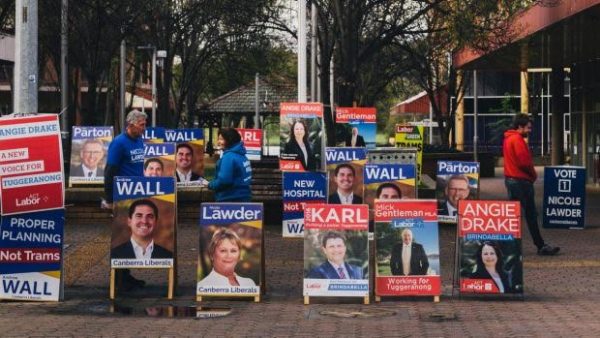
The new truth in political advertising laws will not come into effect before this year’s ACT election. Photo: File.
The laws were lauded by The Australia Institute, which has been lobbying for the laws and called the development a “stunning breakthrough”.
“Disinformation and the distortion of truth is one of the big issues of our age,” said executive director of the Australia Institute Ben Oquist. “Unless action is taken, we risk our public debate sliding into a fake news free-for-all.
“Around the world, democracies are struggling to adjust to a world full of disinformation. How to address this challenge will be a defining issue of our age.
“Elections – the very heart of our democratic system – need the most protecting from these trends, and political parties and politicians have a special responsibility to act.”
One notable difference between the 2016 and 2020 elections is that city rangers are now able to immediately remove non-compliant electoral posters instead of having to notify the party and wait seven days.
The 2016 ACT election review detailed 132 complaints made relating to a party and a candidate’s activity, up from 110 in 2012 and 105 in 2008. However, the majority of these complaints related to canvassing within 100 metres of a polling place and incorrect authorisation of advertisements.
“Where the Commissioner was of the view that a breach of the Act may have occurred, the Commissioner’s first approach was to contact the potential offender and ask them to comply with the Act,” the 2016 election review found.
“All reported cases of unauthorised electoral matter are addressed in the first instance with a request to cease distribution of unauthorised matter and to ensure the matter is correctly authorised.
“This process is generally very effective. The Commissioner did not see cause to refer any unauthorised material to the Australian Federal Police for prosecution in 2016.”
For more information about political donations, disclosures and the upcoming ACT election, visit the ACT election website.













